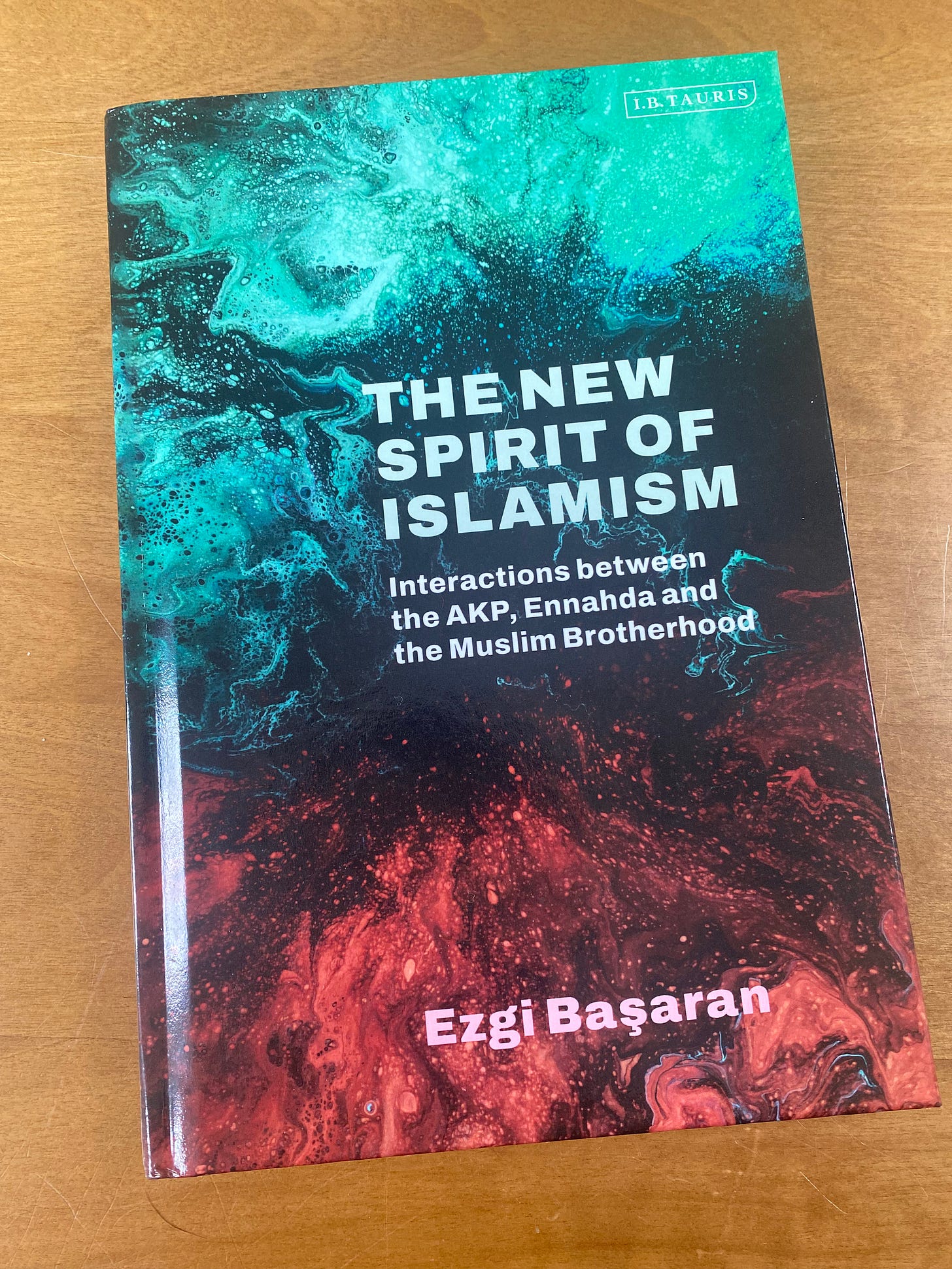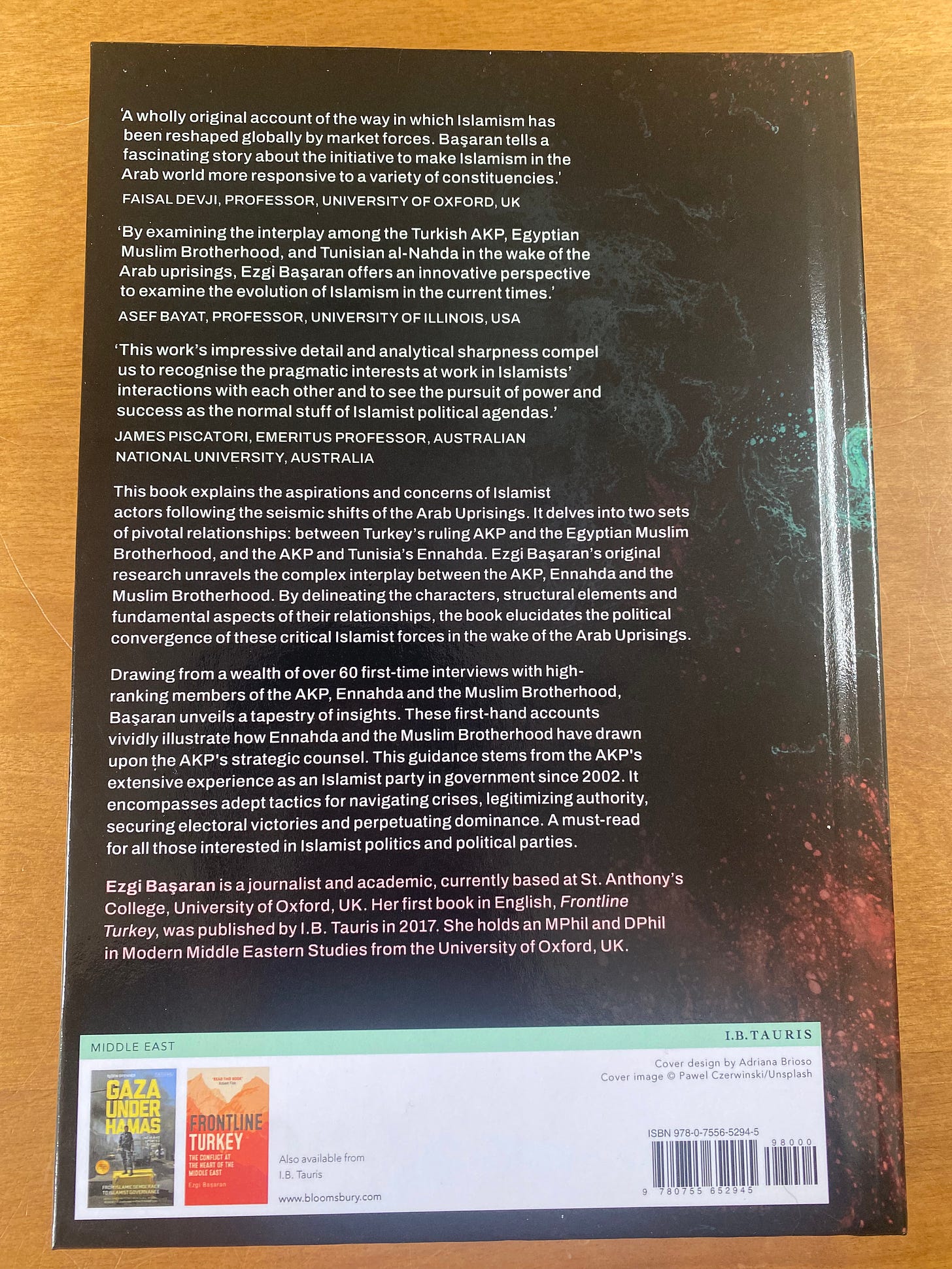My new book is out: The New Spirit of Islamism
The interplay was not based on an aspiration to build an ideological Islamist bloc in the MENA region. Instead, it revolved around the concept of political success and had a strong neoliberal ethos.
When my publisher first presented several options for the book cover, I never imagined I would choose the one you see now. Initially, it seemed more fitting for a chemistry textbook. However, a few days later, I realized that the book I had written may indeed be about chemistry—specifically, the chemistry between three political entities and how ideology is malleable, with a fluid and ever-changing morphology.
The title of my book, "The New Spirit of Islamism," is clearly inspired by Weber’s seminal work "The Protestant Ethic and the Spirit of Capitalism" and Boltanski and Chiapello’s "The New Spirit of Capitalism." It delves into the diffusion of tactics among three Islamist entities that emerged in the wake of the Arab Uprisings, exploring what this means for the essence of Islamism.
As with all research, mine began with genuine curiosity: What was the bond between Turkey’s ruling Justice and Development Party (AKP) and the Egyptian Muslim Brotherhood (MB)? What was the connection between the AKP and Tunisia’s Ennahda? What were they discussing? Why were they meeting so frequently? These relationships, often cloaked in mystery, were widely assumed to be centred around an Islamist agenda, particularly due to the involvement of the MB—the oldest Islamist movement, known for its transnational reach.
However, my findings tell a more complex and nuanced story. The interplay was not based on an aspiration to build an ideological Islamist bloc in the MENA region. Instead, it revolved around the concept of political success and had a strong neoliberal ethos.
Through over 60 interviews with high-level members of the AKP, Ennahda, and the MB, I show how Ennahda and the MB, in their quest for success and legitimization, relied heavily on the managerial prescriptions provided by the AKP. This success formula, derived from the AKP's experience as an Islamist party in power since 2002, includes tactics on crisis evasion, legitimization, winning elections, and maintaining power.
In the aftermath of the Arab Uprisings, Turkey found itself in a unique position. The AKP, having enjoyed successive electoral victories and demonstrated competence in running a market economy, was poised to promote the so-called ‘Turkish model.’ This model was seen as a beacon for aspiring Islamist parties in Tunisia and Egypt, which were emerging from authoritarian regimes characterized by crony capitalism and had little to no experience in governance. Turkey seized this geopolitical moment, envisioning a Middle East and North Africa (MENA) dominated by governments it could mentor and support—much like the EU's efforts to guide former Soviet countries towards democracy and market economies. It was within this context that the aforementioned relationships were forged.
My book departs from the usual approach of examining Islamist parties in isolation within their national contexts. Instead, it presents the first scholarly study of the interplay between the AKP, Ennahda, and the MB between 2011 and 2013. Through this lens, I characterize the actors, the structure, and the main features of their interactions, shedding light on a political confluence that has shaped the region’s trajectory.
[More coming in the next post] In the meantime, if want to buy the book, you can find it on all booksellers’ websites, big or independent.
Endorsements for the book from the ‘giants’
‘A wholly original account of the way in which Islamism has been reshaped globally by market forces. Basaran tells a fascinating story about the initiative to make Islamism in the Arab world more responsive to a variety of constituencies.’
Faisal Devji, Professor, University of Oxford, UK
‘By examining the interplay among the Turkish AKP, Egyptian Muslim Brotherhood, and Tunisian al-Nahda in the wake of the Arab uprisings, Ezgi Basaran offers an innovative perspective to examine the evolution of Islamism in the current times. The book is particularly instructive in showing what happens when the oppositional Islamic movements transition into governing bodies. A very valuable contribution to our understanding of political Islam today.’
Asef Bayat, Professor, University of Illinois, USA
‘In this meticulously researched examination of the interplay between Islamist political parties, Ezgi Basaran offers invigorating insights into how the transnational diffusion of influence is more tactical than ideological. She robustly challenges reductionist assumptions that simply equate Islamism with Islamisation of state and society, and exceptionalist assumptions that underplay the conventional political calculus even Islamists must make. This work's impressive detail and analytical sharpness compel us to recognise the pragmatic interests at work in Islamists' interactions with each other and to see the pursuit of power and success as the normal stuff of Islamist political agendas.’
James Piscatori, Emeritus Professor, Australian National University, Australia





